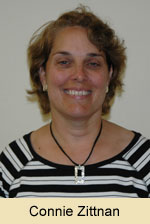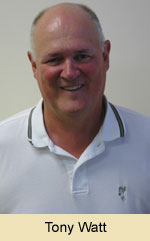New director hired for archdiocesan
schools consortium
By Brandon A. Evans
Connie Zittnan, principal of St. Andrew and St. Rita Catholic Academy in Indianapolis for the past decade, recently began her new job as director of the archdiocesan schools consortium.
The consortium, which was called for about a year ago by Archbishop Daniel M. Buechlein, is an umbrella organization for six Indianapolis center-city schools. The schools are able to operate more efficiently by sharing some resources, such as finances, maintenance and marketing. The schools also have developed a common academic curriculum.
 The schools that are part of the consortium are Holy Angels School, Holy Cross School, Central Catholic School, St. Andrew and St. Rita Academy, St. Anthony School (formerly All Saints School) and St. Philip Neri School.
The schools that are part of the consortium are Holy Angels School, Holy Cross School, Central Catholic School, St. Andrew and St. Rita Academy, St. Anthony School (formerly All Saints School) and St. Philip Neri School.
Zittnan officially started her new job on July 1.
Her responsibilities, she said, include “working directly with the consortium schools and the principals with regard to academics and curriculum improvement, facility improvement and maintenance, [and] marketing and development.”
Tony Watt, who served as the administrator of the consortium over the past year, said that it has been difficult for the center-city schools—even with aid from the archdiocese and other groups—to meet all their costs.
Watt said that in the past when a school has had a financial problem, it was only able to turn to its parish base for help. The new consortium provides a much larger base to tap into.
“The consortium has a better chance of dealing with [these issues] collectively for all the schools than each school trying to deal with it on its own,” Watt said.
The work that the consortium—staffed by Zittnan, Vicki Miller and Watt (as a volunteer)—does allows principals to spend more time focusing on being the educators and mentors that they’re supposed to be, Watt said.
 The past year was spent getting the consortium organized, and running and preparing to take on the challenges of another school year.
The past year was spent getting the consortium organized, and running and preparing to take on the challenges of another school year.
“It’s going to be another tough but good, long year,” Watt said. “We’re looking forward to it.”
Part of his work will include forming a board of trustees.
Watt said that the new director is able to work well with others and has a passion for the center city.
“She has one of the schools that has demonstrated improvement in academics, which is very important to us,” Watt said. “She has a good understanding of the broader perspective of what we need to get done.”
Having served as a principal in one of the center-city schools, Zittnan said that when talk of the consortium first began she could see the potential and the benefits of having several schools working together.
“I think that the consortium model is going to be a big plus for the urban schools,” she said. “I see a lot of good things in the future to come from the consortium.”
Zittnan said that she will miss her old job.
“When you’re someplace for 10 years, it becomes part of who you are,” she said.
Still, she will remain a part of the life of the school because her job will require a lot of work at each of the schools.
Watt shares Zittnan’s passion for the center-city schools.
“One of the things that keeps me involved in this is … the passion and the dedication of the archbishop to the center-city,” he said.
The fact that those schools are still operating is a testament to the commitment of the archdiocese, he said.
“We have to learn different ways of doing things so we can be more efficient and yet continue to bring up the quality of the education that we provide to our students,” Watt said.
The need for the consortium—and its need for continued donations and support—is something that is part of our modern-day situation, he said.
“I’m from a generation that was fortunate to receive a Catholic education provided by two different religious orders of nuns,” he said, “and the cost to educate my generation … and many generations prior to that was far less as far as a percentage of my parents’ income than what the cost of a Catholic education is today to these parents’ income.
“It’s a whole different ball game economically,” he said. “I certainly hope that those who feel a passion for what they have become because of their Catholic education might think about what they can do from a stewardship standpoint to help those that are trying now to receive a Catholic education.
“The laity has become the stewards of those schools,” Watt said, “and it’s up to us to keep them going.” †
 The schools that are part of the consortium are Holy Angels School, Holy Cross School, Central Catholic School, St. Andrew and St. Rita Academy, St. Anthony School (formerly All Saints School) and St. Philip Neri School.
The schools that are part of the consortium are Holy Angels School, Holy Cross School, Central Catholic School, St. Andrew and St. Rita Academy, St. Anthony School (formerly All Saints School) and St. Philip Neri School.  The past year was spent getting the consortium organized, and running and preparing to take on the challenges of another school year.
The past year was spent getting the consortium organized, and running and preparing to take on the challenges of another school year.